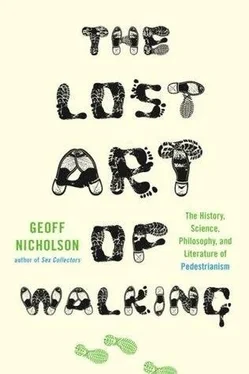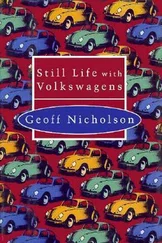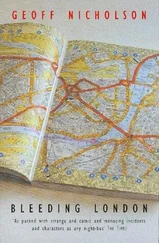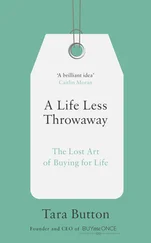Brother you can’t go to jail for what you’re thinking
Or for that ‘woooo’ look in your eye…
Some would probably have it otherwise — and yes, walking is a very different prospect for men than for women.
♦
I’m always fascinated by the female models in fashion shows, the ones who parade up and down on the runways and catwalks. They’re sexy, all right, and it’s got a lot to do with the way they walk, but it’s a very specialized form of walking. They strut and stomp, they stride out, hammer their feet down, scissor their legs across each other, and look as though they’re really determined to get somewhere, but of course they never really do get anywhere. They just get to the end of the runway and then they spin around on their stiletto heels and head back precisely where they came from. This only just counts as walking. And runway is such a strange term, because it sounds like they’re at the airport, taxiing, getting ready to fly. But these fashion models never lift off. They don’t even run on the runway.
Streetwalker is another term that doesn’t quite describe the sexuality or the style of walking to which it refers. Yes, streetwalkers operate in the street, and, yes, they’re on their feet, but how much walking do they actually do? Streetwalkers have always been the lowest of prostitutes. The Oxford English Dictionary dates the word to 1592, but even if the word was newfangled at the time, the practice surely was not. The streetwalker is, and always has been, the most vulnerable of sex professionals. The sight of a woman walking at night, whether she’s selling herself or not, is enough to stir uncontrollable urges in some men. It has required some women to take back the night.
And yet, here and now in the West, women walkers are surely safer than they’ve ever been. That may not be saying a whole lot, but here’s the Spanish feminist Margarita Nelken claiming that walking was the one thing that separated her, a twentieth-century woman, from her mother and grandmother. ‘This footing’, she writes:
‘‘this morning walk — elastic step, rhythmic body in loose, comfortable clothing — of the girls that walk for hygiene in these clear and warm days of early spring…they have opened the windows of the sad room in which their grandmothers sat.’
She wrote that in 1923 in a magazine called La Moda Elegante .
There are, I think, certain ways in which sex and walking closely resemble each other. For one thing, they’re both at heart basic, simple, repetitive activities that just about everybody does at one time or another. And yet despite being so ordinary and commonplace, they’re both capable of great sophistication and elaboration. They can be completely banal and meaningless, and yet they can also involve great passions and adventures. Both can lead you into strange and previously unknown territories: a walk on the wild side.
♦
So, if I have never cruised, catwalked, or streetwalked, I also hope I’ve never flounced, as in ‘flounced out of the room’. Stormed , I think, is the preferred manly word here. Sometimes, less forcefully, I may have sloped off or stolen away. I have sidled, tiptoed, pussyfooted, perhaps even slunk.
I have hit the streets, pounded the pavement, worn out shoe leather, taken shank’s pony, hotfooted it, legged it, strode out, loped, paced. So far I have never waddled, but as the years pass and the pounds pack on, it may be a fate awaiting me.
Otherwise I may well have promenaded, pedestrianized, peregrinated, ambulated, perambulated, circumambulated, hoofed, and locomoted, but these aren’t words I’d ever normally use. And I’ve never said, as apparently they do in Cockney rhyming slang, ‘gone for a ball of chalk’, although I’ve probably done the deed it describes, which is essentially to ‘get lost’.
I’m sure I’ve strutted, but I’m pretty damn sure that I’ve never swaggered. In a notorious speech he made at the Republican National Convention in 2004, George W. Bush said, to the delight of the supportive crowd and the consternation of others, ‘Some folks look at me and see a certain swagger. In Texas we call it walkin’’.
♦
In fact, the word swagger has its origins in the Norwegian dialect word svagga , meaning to sway, which may not be quite what the ex-president had in mind. However, given the capacity of the English language to soak up words from elsewhere, it’s hardly surprising that many of our words for walking originate in other tongues.
French gives us promenade and march , and the word mooch has its origins in the Old French muchier , meaning to hide or skulk. We get shuffle from the Low German schüffeln , and tramp from Old Teutonic. Trek comes from the Dutch, via South Africa. Flounce comes from jlunsa , a Scandinavian word that means hurry in Norwegian and plunge in Swedish.
What’s more surprising is that if you consult the Oxford English Dictionary to find where the words trudge, stroll , and saunter come from, you’ll find them simply designated ‘origins obscure’. Hike is ‘original dialect obscure’. Strut is ‘obscure’, and ramble is simply ‘origin unknown’.
Some words, more comprehensibly, have been borrowed from other parts of English for their metaphoric possibilities.
Ambling , for instance, despite its historic Latin origins, was once a thing done only by horses — meandering was done only by rivers. The word slope , as in slope off, didn’t contain the sense of walking at all until the mid-nineteenth century, and is one of the few genuine all-American coinages. Pussyfoot is another, even later one, being the nickname of one W.E. Johnson, a lecturer and advocate of Prohibition.
I began to wonder whether other languages have as many words for walking as English does. I put the question out among my polyglot friends and acquaintances and was impressed by their enthusiasm for the subject. Any misinformation in the paragraphs that follow is naturally all their fault.
A friend in Sao Paolo reported with dismay that his Portuguese thesaurus listed only eight synonyms for walking, and none of them approximated his favorite word, trudge . Another friend, whose Farsi is admittedly rusty, came up, via her mother and grandfather, with nine synonyms, including kharamiden — to walk elegantly, like a deer — jahiden — to walk percussively, like a frog — and verjeh vorjeh harden — to squirm about. The Norwegians seemed much better supplied. My source came up with over fifty synonyms, including vagge, flahke, sjangle , and spankulere .
From an American now living in Italy I learned such colorful walking phrases as darsela a gambe (to make with the legs) and alzare i tacchi (pick up the heels), both of which mean to run away. He also came up with the word cammellare , literally to walk like a camel, a style adopted by disaffected youths who slouch along, head down, creating a camel-like hump on their backs.
The Germans, I learned, have the quaint expression auf Schuster’s Rappen , which means ‘on the shoemaker’s black horses’, pretty much the equivalent of shank’s pony, and a particular favorite of mine is Um den Pudding laufen , which means to walk round the block or go the long way round, or literally ‘running around the pudding’.
Instead of using various different words for walking, the Japanese use a common base verb, then add an assortment of phenomimes, which are used as adverbs. So aruku is the basic word meaning to walk, then chokochoko aruku is to toddle, noronoro aruku is to inch along, furafura aruku is to shamble or teeter, and zorozoro aruku is to swarm or cluster.
Читать дальше












